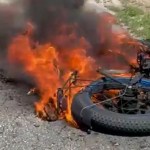The Regional District of East Kootenay (RDEK) has launched a pilot composting project in Fernie. Residents are welcome to participate in the compost pilot program by voluntarily dropping off accepted organic materials in the marked bins at the RDEK Transfer Station in Fernie.
The project is aimed at household kitchen waste and runs now through the end of October. The program accepts nearly all kitchen scraps. While many residents already compost fruits and vegetables on a small scale, there are food scraps, such as meats, cheeses, paper plates, and paper towels that are not appropriate for backyard composting due to the potential for attracting wildlife and pests. These are all accepted in the pilot program.
All kitchen scraps (including meats, cheese and cooking oils) are accepted in the compost. Paper plates, tissues and paper towels are also allowed.

Accepted:
Food waste and food contaminated paper including:
Meat and small bones
Bread and grain products
Coffee grounds and filters
Tea bags
Dairy products
Egg shells
Baked goods
Fruit and vegetables
Pasta products
Nutshells
Fats, oils, butter, and mayonnaise
Food contaminated napkins, paper towels, paper plates and tissues
Wooden popsicle sticks and toothpicks
NOT Accepted:
Yard trimmings including grass clippings, tree and hedge prunings, leaves, plants, weeds and flowers
Plastics of any kind (including compostable and biodegradable plastics)
Glass
Pet waste/kitty litter
Disposable coffee cups
Styrofoam
Wax coated crayons
Diapers and baby wipes
Wire, twist ties, and rubber bands
Rocks dirt and sod
Stumps and logs
Wax paper and aluminum foil
Cigarette butts
Vacuum contents and bags
Plastic bags, including compostable and biodegradable plastic are not accepted in compost drop-off bins. Newsprint is recommended to line the bottom of your personal collection bin.
Drop-off bins and processing piles will be located within the fenced and staffed areas of the transfer station. The waste is no more of an attractant than standard household garbage. Local municipal bylaws and waste management protocols apply. Ensure your personal collection bin is stored in a secure location.
Where can I bring my yard waste?
There are dedicated areas at the Fernie Transfer Station for yard and garden waste. There is no charge. Please continue to use this dedicated bin for yard waste. The marked compost bins are for household kitchen scraps only.
What about wildlife?
Drop-off bins and processing piles will be located within the fenced area of the Fernie Transfer Station. The waste is no more of an attractant than standard household garbage. Local municipal bylaws apply. Please ensure your personal collection bin is stored in a secure location.
The public drop-off period ends on October 31, 2016. The next step in the project will be to conduct quality testing on the compost through the winter and early spring. The results of the pilot project will be reported to the RDEK Board in 2017.
In addition to the public drop-off program, the RDEK is also engaging with a number of commercial businesses to pilot dedicated collection for larger waste producers. Organics collected through the public drop off bins and the commercial program are being combined and processed together using a low-tech, but highly efficient method to process the organic materials, using carefully monitored windrows.
For more information on the pilot program, contact Kevin Paterson at kpaterson@rdek.bc.ca or by phone at 250-489-2791 or 1-888-478-7335.





















